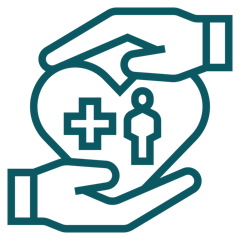Are you interested in solving multifaceted issues with social, political, cultural, economic, and historical forces that impact health outcomes? You are in luck, because a career focused on socio-medical sciences (SMS) in public health aims to do just that. You will tackle interdisciplinary issues with numerous layers – historical, anthropological, economic, etc. - across numerous domains.
According to the Mailman School of Public Health at Columbia University, socio-medical sciences take public health challenges on a broad social, historical, and political context at the local, regional, and global levels. This includes challenges saddled with social inequality and health inequities throughout society. Some examples of public health issues that fall within this realm are aging, obesity, urban health, sexual health, homelessness, mass incarceration, adolescent health, immigrant health, etc1.
Socio-Medical Sciences in Public Health
What does socio-medical sciences mean in the context of public health?
Social science theories and methods can contribute to understanding the distribution of health problems in the population. Social sciences focus on identifying and addressing persistent social realities and inequalities with an interest in advancing the understanding of social forces that shape public health. Social scientists use theories in the following disciplines from anthropology, psychology, sociology to economics, ethics, and history2. Social science research is imperative to addressing public health issues and stimulating transformation for the better.2
There are more specific topics within the socio-medical sciences realm that are worth diving into. Social epidemiology looks to pinpoint societal characteristics that affect the pattern of disease and health distribution, and delve into its mechanisms5. One main question in this discipline is what effect do social factors have on individual and population health? Moreover, medical sociology addresses “how social stratification affects patterns of health and illness behavior, illness risk, disability, and other health care outcomes”6.
Both disciplines emphasize the role of socio environmental factors in health and disease on individuals, groups, and society as a whole (6). These subdisciplines all fall under the socio-medical sciences, which as stated previously, take a holistic approach to addressing public health issues.
What is the role of socio-medical sciences in public health?
Socio-medical science in public health has numerous career paths which can be pursued. Some examples of roles within the socio-medical sciences space are:
Research project manager or research analyst at the PA State Psychiatric institute
Policy maker at the Department of Aging
Outreach coordinator at a homeless shelter1
Moreover, if one decides to pursue a PhD, there are many research opportunities within this socio-medical science space. As an example, one PhD student at Columbia Mailman School of Public Health, is studying the emergence of abortion doulas across various states, particularly in the South where political opposition is robust4. As one might conclude, there is no shortage of socio-medical science in public health concerns to tackle in the future2. There will only be more pandemics, more issues related to climate, and so forth to delve into.
We need a strong public health workforce, and specifically those who work on finding interdisciplinary solutions to these pressing needs.
Why should you pursue a career in socio-medical sciences?
A career in socio-medical science is not the “traditional” public health route – but rather takes a different approach to solving society’s issues. Understanding how history, anthropology, psychology, and other socio-medical sciences topics contribute to the current state of public health is imperative.
Let’s investigate the various routes that can be taken within this topic:
There are numerous career paths and/or advanced training one could venture into with a degree in socio-medical sciences. With an undergraduate degree in socio-medical sciences, the clinical health professions career path is an option with further graduate-level training such as physician assistant, nursing school, dental school, occupational therapy, osteopathic medicine2.
Moreover, an undergraduate degree in this can lead to entry level positions in allied health fields such as community health worker, health education specialists, healthcare administrator, health policy analyst, and public health researchers2.
Steps for how to prepare for a career in socio-medical sciences
So, if reading up to this point has piqued interest, here are a few tips to consider before embarking on this career path. If possible, take academic courses in the social sciences, public health, and biology to further deepen your understanding of socio-medical sciences2. Be aware there are entry level positions within this realm, but further advanced training will most likely be needed for future success. Some skills to focus on for a degree in this space are flexibility and innovation3.
Narrowing down one’s interest within the socio-medical science space is incredibly important to finding the college or program that suits an individual’s goals. Review the college’s and/or program’s website to learn more about the various classes needed to obtain the degree. There may be options to pursue a certificate, along with your degree, which will only allow a candidate to stand out more to a potential employer or advanced training admissions team1.
While this depends solely on an individual’s interests, some degree programs one can look into are: Columbia Mailman School of Public Health and SUNY Geneseo. Both institutions have SMS majors with proven track records of success for their graduates1,2. Socio-medical sciences in public health looks further than numbers and statistical evidence to tackle issues but works to understand the social, political, historical, cultural, and economic forces that are behind various health outcomes.
If you are ready to change people’s lives for the better, and help future generations, pursue a public health degree in socio-medical sciences today.
About the Authors
Dive Deeper in Research

Is An MPH Worth It?
Before asking whether a Masters in Public Health is worth the time, effort and commitment of a masters program, it’s worth asking first what a Masters in Public Health (MPH) degree is.

Why Study Public Health?
Public health is one of the fastest growing fields with excellent employment potential immediately after completing a master’s degree, but many people struggle to define the field1. Often, it’s determined by what it is not: someone working in public health is not a doctor, they are not an EMT, and they don’t see patients. So what do we mean by public health and what does someone working in the field do?

What is Health Economics?
In a broad sense, economics is the study of decisions, the incentives that lead to them, and the various consequences of those decisions. But how does this apply to public health? This is where the essential role of a health economist comes into play. Please read on to learn more about this topic and its imperative role in public health.



